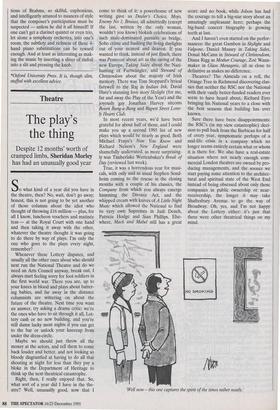Theatre
The play's the thing
Despite 12 months' worth of cramped limbs, Sheridan Morley has had an unusually good year S o what kind of a year did you have in the theatre, then? No, wait, don't go away; honest, this is not going to be yet another of those columns about the idiot who thought of throwing £16 million — plus, for all I know, luncheon vouchers and matinee teas — at the Royal Court with one hand and then taking it away with the other, whatever the theatre thought it was going to do there by way of plays. I'm only the one who goes to the plays every night, remember?
Whenever these Lottery disputes, and usually all the other ones about who should next run the National Theatre and do we need an Arts Council anyway, break out, I always start feeling sorry for foot soldiers in the first world war. There you are, up to your knees in blood and plays about batter- ing babies, and far away in the distance columnists are wittering on about the future of the theatre. Next time you want an answer, try asking a drama critic: we're the ones who have to sit through it all, Lot- tery cash or no new building, and you're still damn lucky most nights if you can get to the bar or unlock your kneecap from under the dress-circle.
Maybe we should just throw all the money at the actors, and tell them to come back louder and better, and not looking so bloody disgruntled at having to do all that shouting at night for less than they pay a bloke in the Department of Heritage to think up the next theatrical catastrophe.
Right, then, I really enjoyed that. So, what sort of a year did I have in the the- atre? Well, unusually good, now that I come to think of it: a powerhouse of new writing gave us Dealer's Choice, Moto, Enemy No I, Bruises, all admittedly (except the last, written by the only woman, wouldn't you know) blokish celebrations of such male-dominated pursuits as bridge, Soho crime and bashing the living daylights out of your nearest and dearest. If you wanted to think, instead of just flinch, there was Pentecost about art as the saving of the new Europe, Taking Sides about the Nazi- hunting of Furtwangler, and Steward of Christendom about the majesty of Irish memory. There was Tom Stoppard's lyrical farewell to the Raj in Indian Ink, David Hare's stunning love story Skylight (for me, far and away the Play of the Year) and the joyously gay Jonathan Harvey sitcoms Boom Bang-a-Bang and Rupert Street Lone- 41 Hearts Club.
In most recent years, we'd have been grateful for about half of those, and I could make you up a second 1995 list of new plays which would be nearly as good. Both Michael Frayn's Now You Know and Richard Nelson's New England were shamefully underrated, as more surprising- ly was Timberlake Wertenbaker's Break of Day (reviewed last week).
True, it was a horrendous year for musi- cals, with only and as usual Stephen Sond- heim coming to the rescue in the closing months with a couple of his classics, the Company from which you always emerge humming the Divorce Act, and the whipped cream with knives of A Little Night Music which allowed the National to find its very own Supremes in Judi Dench, Patricia Hodge and Sian Phillips. Else- where, Mack and Mabel still has a great score and no book, while Jolson has had the courage to tell a big-star story about an amazingly unpleasant hero; perhaps the big-band concert biography is growing teeth at last.
And I haven't even started on the perfor- mances: the great Gambon in Skylight and Valpone, Daniel Massey in Taking Sides, Donal McCann in Steward of Christendom, Diana Rigg as Mother Courage, Zoe Wana- maker in Glass Menagerie, all as close to definitive as makes no difference.
Theatres? The Almeida on a roll, the Orange Tree in Richmond discovering clas- sics that neither the RSC nor the National with their vastly better-funded readers ever seem to have heard about, Richard Eyre bringing his National years to a close with the best seasons that building has ever known.
Sure there have been disappointments: the RSC's (in my view catastrophic) deci- sion to pull back from the Barbican for half of every year, symptomatic perhaps of a mid-life crisis in a company which no longer seems entirely certain what or whom it is there for. We also have a real-estate situation where not nearly enough com- mercial London theatres are owned by pro- ducing managements, and the sooner we start paying some attention to the architec- tural and spiritual state of the West End instead of being obsessed about only those companies in public ownership or near- receivership, the longer it may take Shaftesbury Avenue to go the way of Broadway. Oh, yes, and I'm not happy about the Lottery either: it's just that there were other theatrical things on my mind.
Well now – this one captures the spirit of the times rather neatly.'










































































































 Previous page
Previous page